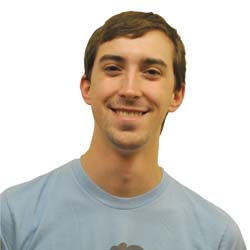What if scientists manipulated your brain so you couldn’t tell if people were physically attractive? What if Superman landed in the Soviet Union and was raised to protect the Soviet Way?

Students in Assistant Professor Gerard Canavan’s newest class are taught to ask just these kinds of ‘what if?’ questions with a focus on one of the most-loved, literary genres— science fiction.
The course, offered as a literature course in the English department, aims to teach students to suspend disbelief, ask questions about continuing social issues and consider science fiction as literature.
The course will examine 21st century science fiction stories in books, comics, movies and even video games.
“It’s a transmedia class, so we’re doing a couple of novels, we have short stories, we’re doing “Avatar” as a film,” Canavan said. “We’re going to watch a couple episodes of TV shows and play “The Walking Dead” game.”
The course will also cover the novel “Superman: Red Son” by Mark Millar, “Oryx and Crake” by Margaret Atwood and “Fledgling” by Octavia Butler as part of its examination of sci-fi.
Science-fiction is more than just a pasttime for Canavan, however, with his unconventional literature dissertation at Duke University focusing in the genre.
“I have a chapter on ‘death by war,’ ‘death by environment’ and ‘death by zombies,'” Canavan said.
Environmental issues are at the forefront of many of Canvan’s students’ minds in taking the course.
“Look outside today, it is 90 degrees and it always seems it is 90 degrees,” Canavan said indicating Milwaukee’s traditionally less than balmy weather. “We have all these climate related emergencies, crises, and it seems our science fiction imagination is becoming real, in the most nightmarish way.”

“Movies like “Avatar” or like “WALL-E” force us to confront the terrible ideas of what we are doing on this planet,” Andrew Hoffman, a Marquette graduate student studying English, said.
Canavan’s class will also cover several pieces of science fiction that center on apocalyptic stories, a growing trend in the genre. “There’s a desire for everything to break so finally we can have what we want,” Canavan said. “Once broken we like to think, we will fix the problem.”
Russ Hamer, a graduate student enrolled in the class, said he enjoys the end-of-the-world scenarios.
“Science fiction is unique in that the readers expect somewhat bizarre occurrences to happen,” Hamer said. “So I’m not bothered when someone is the last person of their entire race left alive or something of that sort.”
Stephen Markowski, a junior in the College of Arts & Sciences, enrolled in the course this semester after a lifelong connection with says science fiction.
“My earliest memory is watching a naked Arnold Schwarzenegger ripping a man’s heart out. That drastically changes a person,” Markowski said. But besides the gore, Markowski feels that science fiction has made him aware of deeper existential questions about artificial reality.
“In interacting with some text or film or show, (people) considered the deeper issue that the text was prodding them to consider and then understood the value in science fiction,” Hamer said.
While using science fiction to contemplate deep issues and anticipate the future, it is important to remember the that many technologies in science fiction have become real. As Canavan reminds his students,“The world that we live in would be science fiction to the people of twenty, thirty years ago.”






Ellie D. • Sep 17, 2013 at 5:41 am
This class sounds great! Reminds me a bit of a class I took freshman year at MU – “Philosophy in Science Fiction”. We focused on novels (Dune, Neuromancer, Left Hand of Darkness, etc) and watched a few episodes of Star Trek and BSG, as well.
Sci-Fi has kind of gotten devalued in pop culture as a genre in recent years, which is too bad – in my opinion, it offers the richest platform for delving into really cool, really relevant issues. The author has the freedom to do whatever they want, so a lot of meaty issues can be breached in a really creative way.
I notice you’re using The Walking Dead game as your game of choice – sounds totally awesome! I lament that all the gaming I’ve been doing lately (Mass Effect trilogy, I’m looking at you) won’t give me any course credit…
danbloom • Sep 8, 2013 at 6:35 am
gerry canavan re ”New sci-fi class covers everything “have u heard of CLI FI for climate fiction genre? see CLI FI CENTRAL blog